The Top 10 Vintage Seiko Watches You Should Buy Now
It’s the New Year and as many people put together resolution lists, we thought we’d do the same and kick off the year with a look at 10 Vintage Seiko watches you should buy right now. Our admiration for Seiko is pretty transparent – from its new releases that we anticipate each March at Basel to our many in-depth articles on classic references (and a recent look on affordable vintage here) – we find that the brand from Japan has so much to offer. Some of our chosen models are extremely familiar and have been covered while some are less known, but still significant. So, Happy New Year and, in no particular order, let’s talk vintage Seiko.
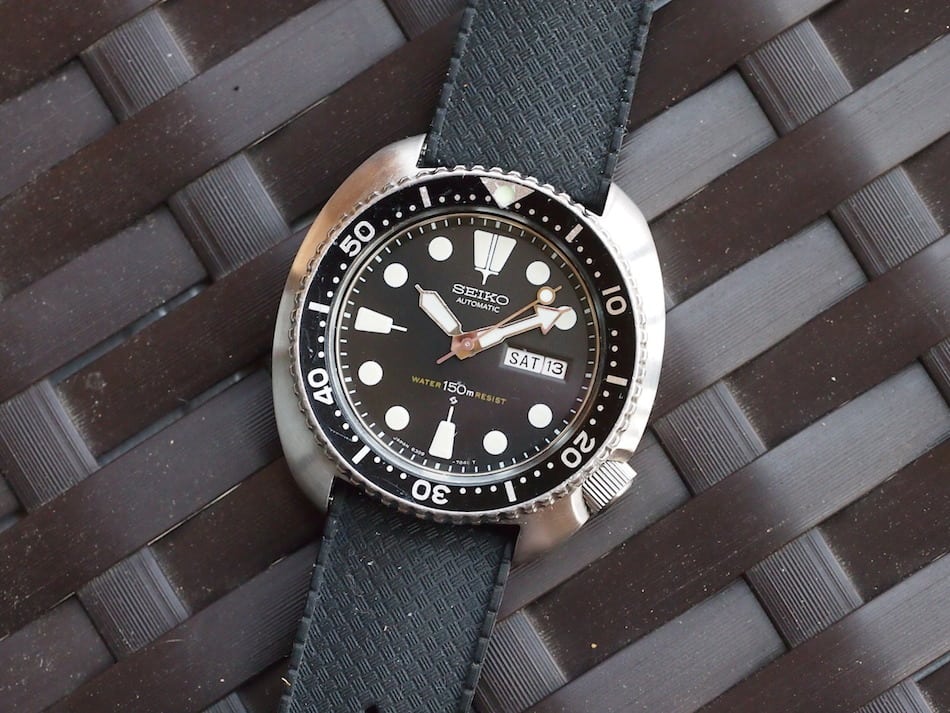
Reference 6309
Seiko 6309
A list of top Vintage Seiko watches absolutely has to include the Seiko 6309. It’s a legendary reference that continues to grow in popularity, status, and, unfortunately, price. Still, though, this chunky cushion-cased diver with a non hand-winding automatic can be found with just a little bit of hard work for around the $400 mark in original condition. We covered the pitfalls one needs to consider when hunting down this 150M diver in an article from 2015, but once a good example is found, it’s such a satisfying quality piece to wear. The 6309 is a Seiko that finds its way into the collections of those who generally prefer far more expensive brands such as Rolex because of the watch’s simple, yet iconic looks and functionality. Robert-Jan sourced one last year and we think Gerard is trawling the market as well – this is one contagious watch! Plus, it’s a “go anywhere” timepiece that could serve as one’s only watch, but we’re here to talk 10 watches, right?
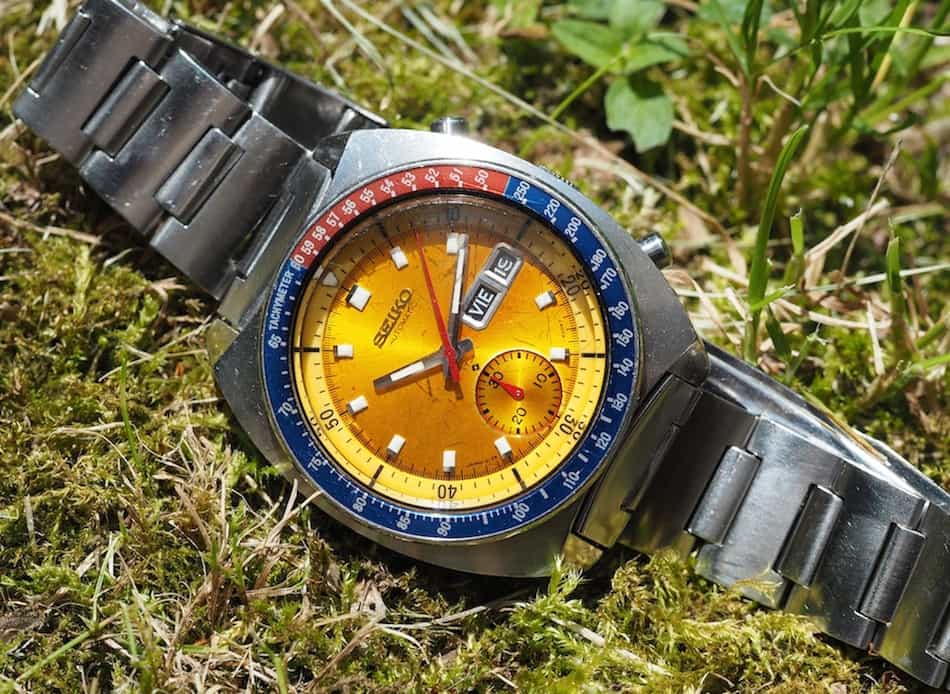
6139 Pogue
Seiko 6139 Pogue
Some may consider the 6139 “Pogue” to be a bit of an eccentric selection within our top 10 Vintage Seiko watches list, but I’m ready to defend the choice. First, if the “Pogue” isn’t the cheapest vintage space flown watch (it went up with Col. William Pogue in 1973 as part of Skylab), it has to be in the running. Next, the 6139 was one of the movements in the race for first automatic chronograph in 1969 – depending on what you want to believe, it can make a claim as the first – and contains a robust, column-wheel equipped movement. Next, and hear me out here, while other dial colors exist, I find the bright yellow dial of the Pogue to be emblematic of Seiko’s design language during the late 60’s-mid 70’s. It’s funky and immediately signifies a different age, but it has aged beautifully. Several variations on the “Pogue” theme exist, but my suggestion is to track down any correct 6139 with a yellow dial. Figure on $500 give or take and that should land you a great vintage chronograph.
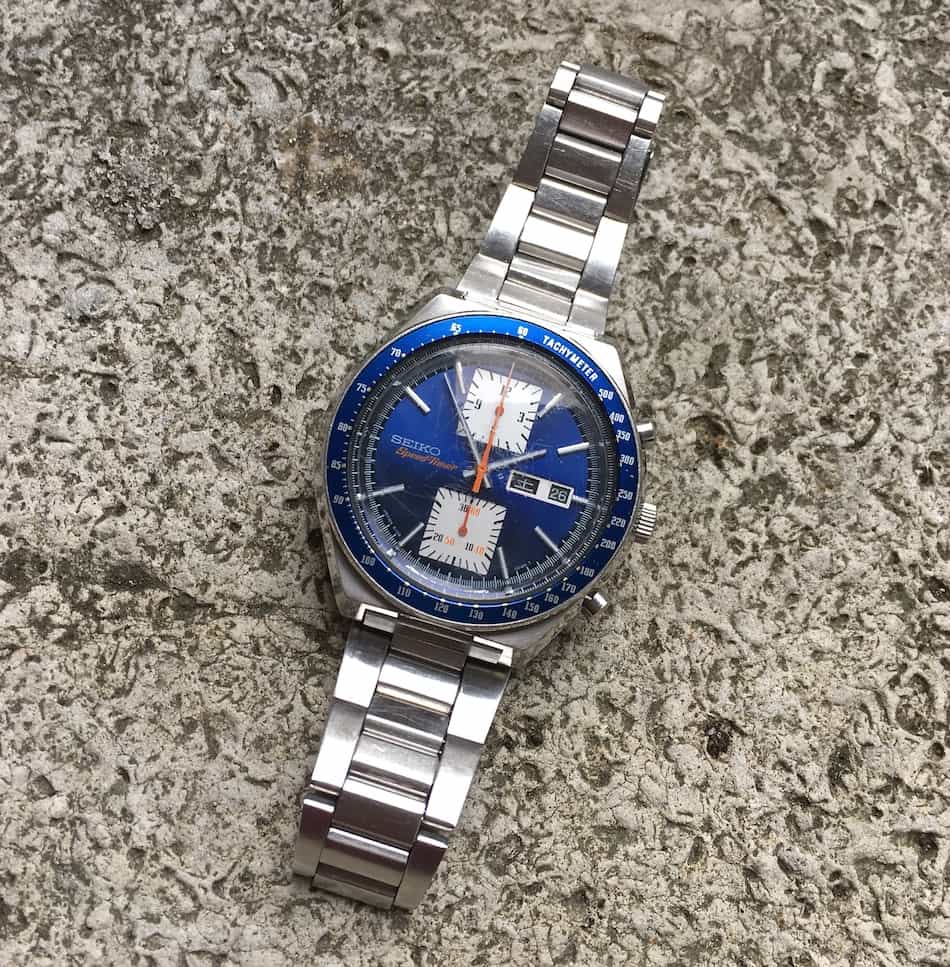
Reference 6138
Seiko 6138 “Panda” or “Kakume”
It’s not necessarily fair to choose two models as one entry within our top Vintage Seiko watches list, but I struggled to pick a clear winner. The 6138 is a relative of the aforementioned 6139 but contains a second sub register and can be hand wound. Apparently, and this is seen by its numerically earlier reference, this is the movement Seiko wanted to release first in 1969, but due to its complexity, it simply wasn’t ready yet. In the two watches mentioned, especially when it comes to the “Panda”, you have what are amongst the most collected and expensive vintage Seiko chronographs on the market.
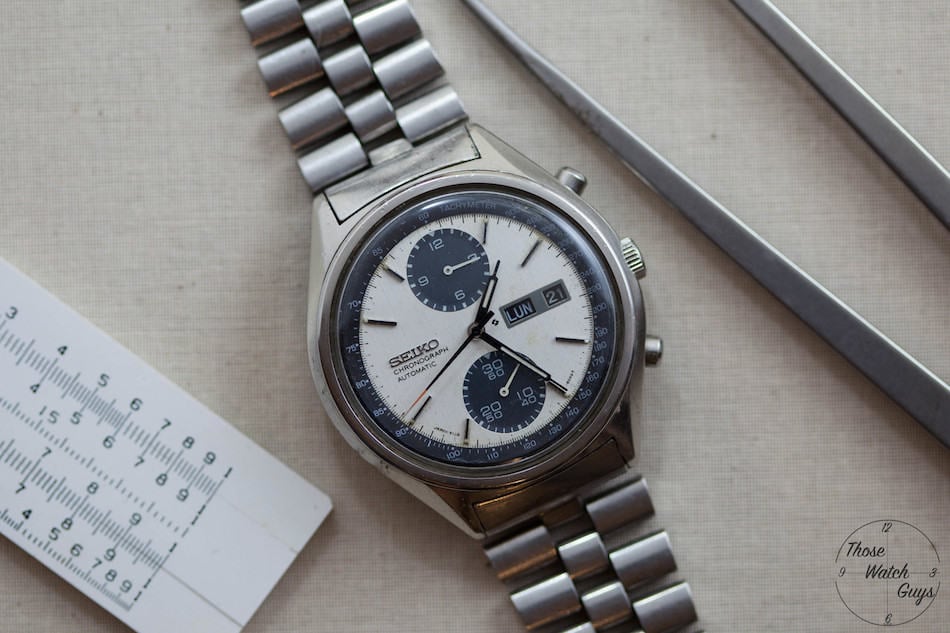
Seiko 6138-8020 – photo courtesy of thosewatchguys.com
The “Panda” routinely eclipses $1,000 and the “Kakume” isn’t terribly far behind. Why is this? Credit relatively classic dials evocative of Swiss brands, serious weight, build quality, and you have a recipe for watches that likely draw in non-Seiko collectors. As always, watch out for aftermarket replacement parts; the market is sadly rife with them. If these legends are too rich for your liking, grab any 6138 model and enjoy 95% of the feeling for less than 50% of the price!
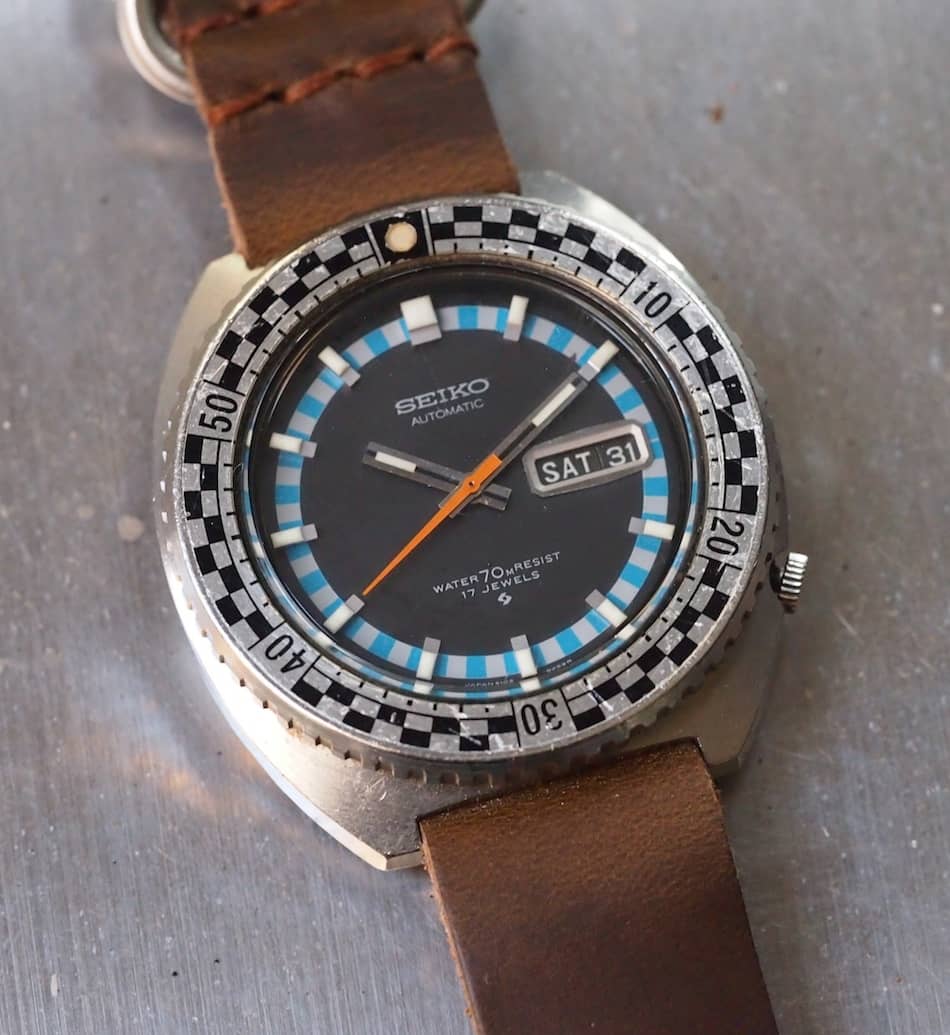
Rally Diver
Seiko 6106 or 6119 Rally Diver
I know we’re not listing our picks for top Vintage Seiko watches in any type of order, but the Rally Diver would be a real frontrunner for me. Part of Seiko’s sport diver series, these watches are water resistant down to 70 meters. What they may lack in serious diving capability, though, they make up in spades with jaw-dropping looks. The Rally Divers are well known to Seiko collectors chiefly because of their amazing “checkered-flag” rotating bezel inserts.
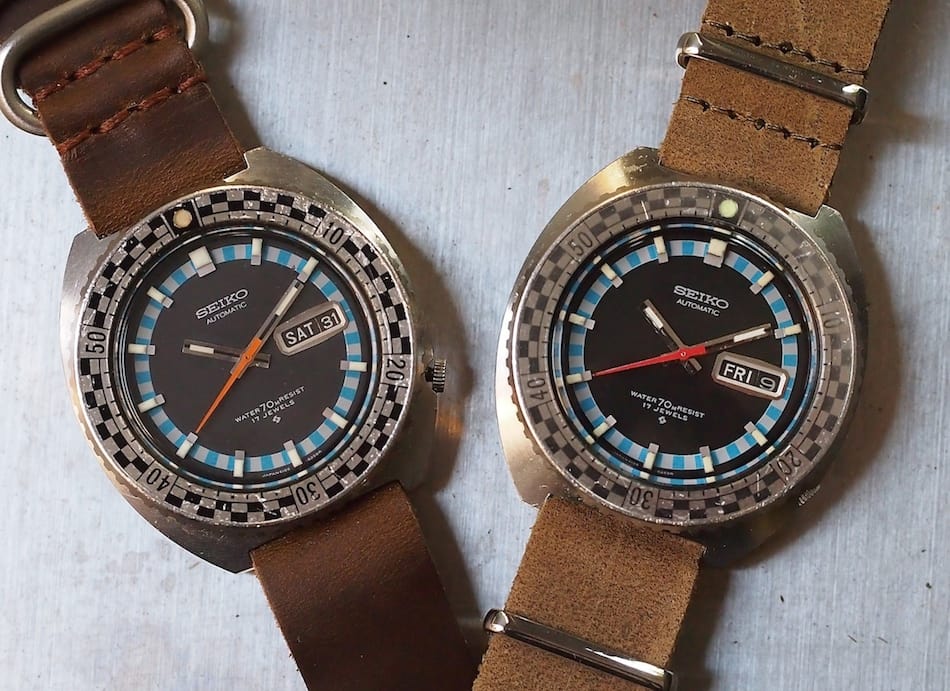
Seiko Rally Divers
Tack on large size, beautiful silver, black or blue dials, and bulletproof automatic movements and you can see why these early 1970’s Seiko’s stand out from the crowd. There’s little difference between the 6106 and 6119 movements aside from extra jewels in the latter. The more noticeable contrast comes on the dial, as 6119’s are part of the “Seiko 5” series. Bezels are prone to fading and one has to be mindful of ensuring the rest of the cosmetic parts are original, but great pieces can still be found for around $400. I’ve sourced several of these for under $200 and Robert-Jan recently landed a great example at a price below market. The Rally Diver…diving and classic car themes all in one watch? You got it!
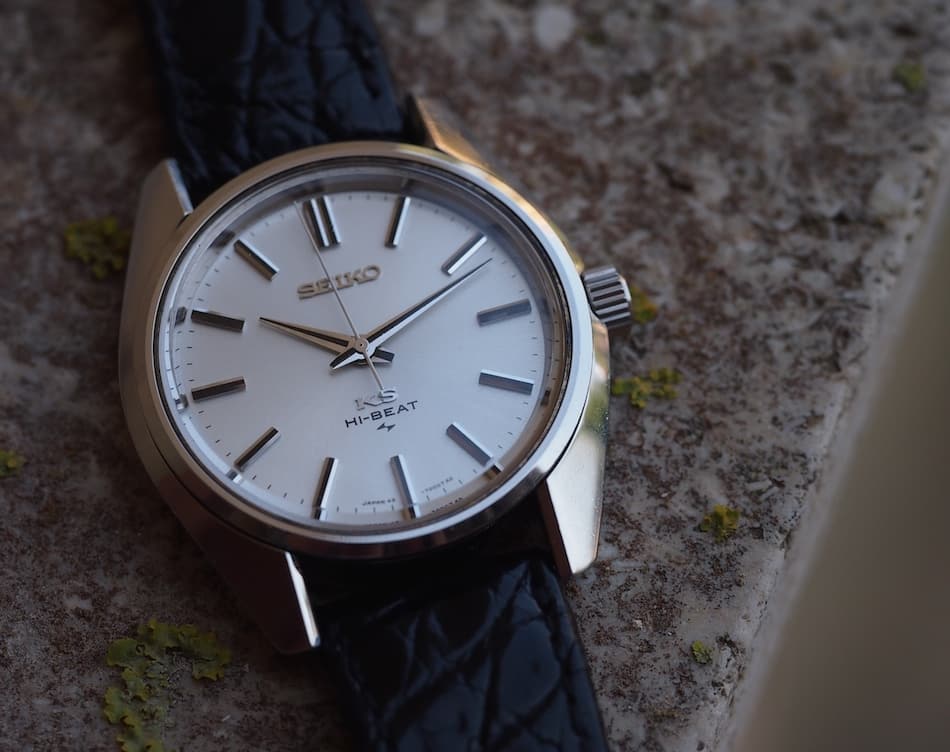
45-7001 King Seiko
A Hi-Beat King Seiko
You’ve read here and elsewhere about the over-the-top quality of Grand Seiko new and old, but you’ve probably read a bit less about the brand’s other former top tier series: King Seiko. We’ve detailed a couple pieces – both a manual wind and automatic Hi-Beat (machine gunning at 36,000 bph) – and believe us, the quality is about 98% as good as a Grand Seiko. Translating that into Swiss terms, a King Seiko trumps just about everything out there from the neutral country from the same time frame of the late 60’s to mid 70’s. Take into account that good King Seiko’s can be found for under $600 all day long and you have one of the greatest dress watch bargains in the watch world.
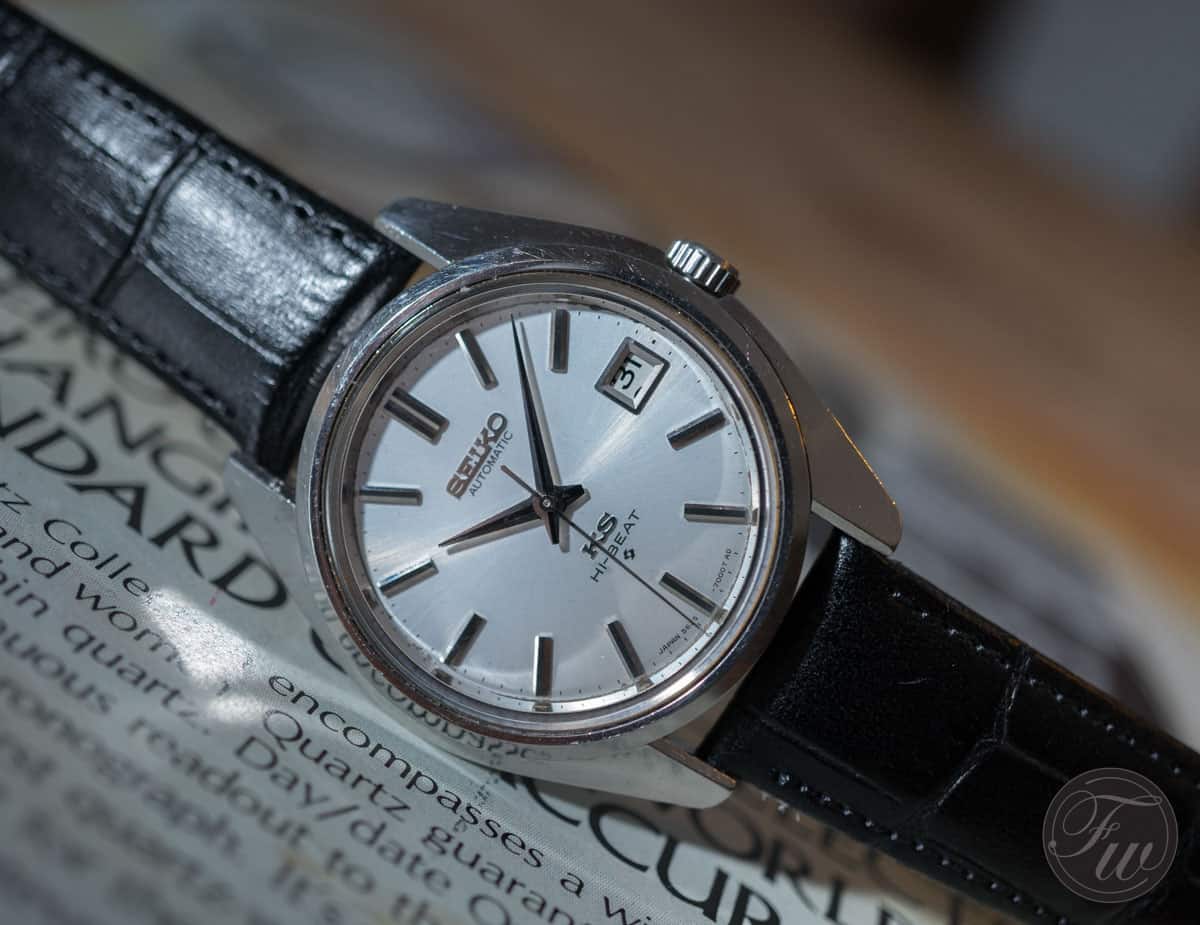
Seiko reference 5625-7000
I mentioned a “Hi-Beat” movement because these early pieces bring in innovation and accuracy that only a few other brands were employing. Plus, I like the razor-esque slab sided “Grammar of Design” styling and the oft-found gold medallions on the case back. Look out for severe dial staining due to moisture, but otherwise buy with confidence as these watches run like a diesel. Interestingly, Gerard, Blaise, Robert-Jan and I all own examples of early King Seiko’s making this the most popular Seiko on the team.
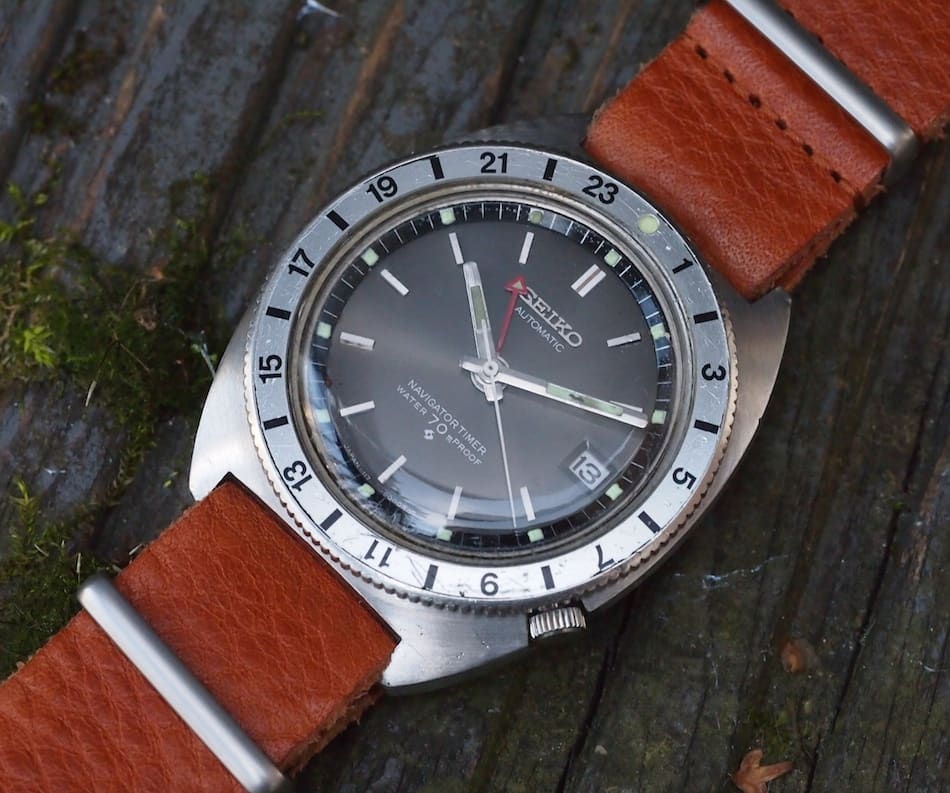
Seiko Reference 6117
Seiko 6117 Navigator
No list of top Vintage Seiko watches you should buy now is complete without the 6117 Navigator. Seiko offered this piece in several designs, but with one real constant – a dual time zone movement that mimics the famous Rolex GMT. In Seiko’s version, though, you have the choice of a model with an external 24-hour bezel, an internal 24-hour bezel and models with a rotating internal bezel that features city names. The early Navigator, reviewed on #TBT, with external bezel is the simplest design and apes a sport diver model from Seiko at the time. These tend to realize the highest prices of all the Navigators with $500 – 600 now a typical cost of entry. Other models tend to sell in the $300 – 450 range and that makes them a nice deal. Of course, like all Seiko’s, the movement is bulletproof and unlike period Rolex GMT 1675’s that cost 15-20X, this watch contains a handy quickset date.
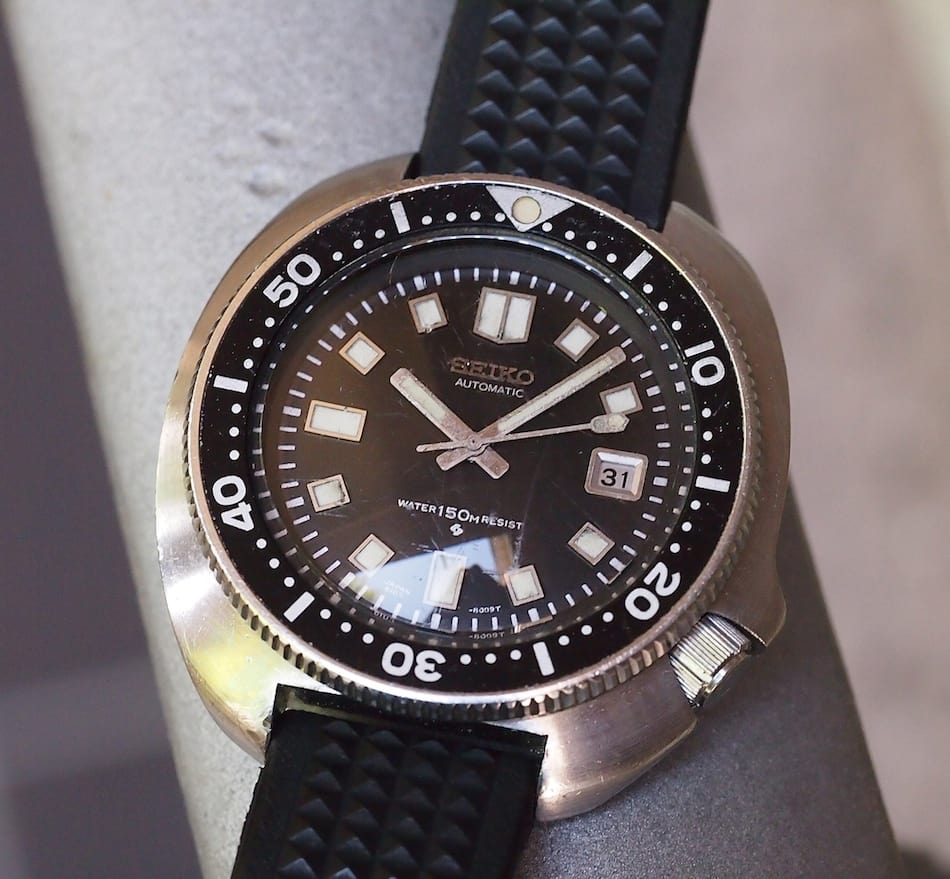
Seiko Reference 6105-8110
Seiko 6105-8110 Diver
The second diver to enter our list of top Vintage Seiko watches is the distinctively cased 6105-8110. If I look at the family tree of professional Seiko divers, this model is my favorite. It set the trend of large, asymmetrically shaped cushion cased divers for the brand and it’s a design language that is still seen today. It had an innovative, but rather forgettable locking crown design combined with an iconic dial and bezel and its rugged build and capabilities also led to its popularity amongst US soldiers in Vietnam. Famously, it was donned by Martin Sheen in Apocalypse Now. These 6105’s now tend to run above $1,000 but you still find them for less at times. They’re often found with heavy patina and loads of scratches – it’s a big case so it tends to smack into things – but they look good with a ton of character and the trademark “waffle” strap. Here again, the movement is stellar and there’s little to worry about function-wise. As far as iconic vintage divers go, I still consider this one to be a serious bargain. It may have come after the legendary, yet traditionally styled 62MAS, but I still think this is the one to have.
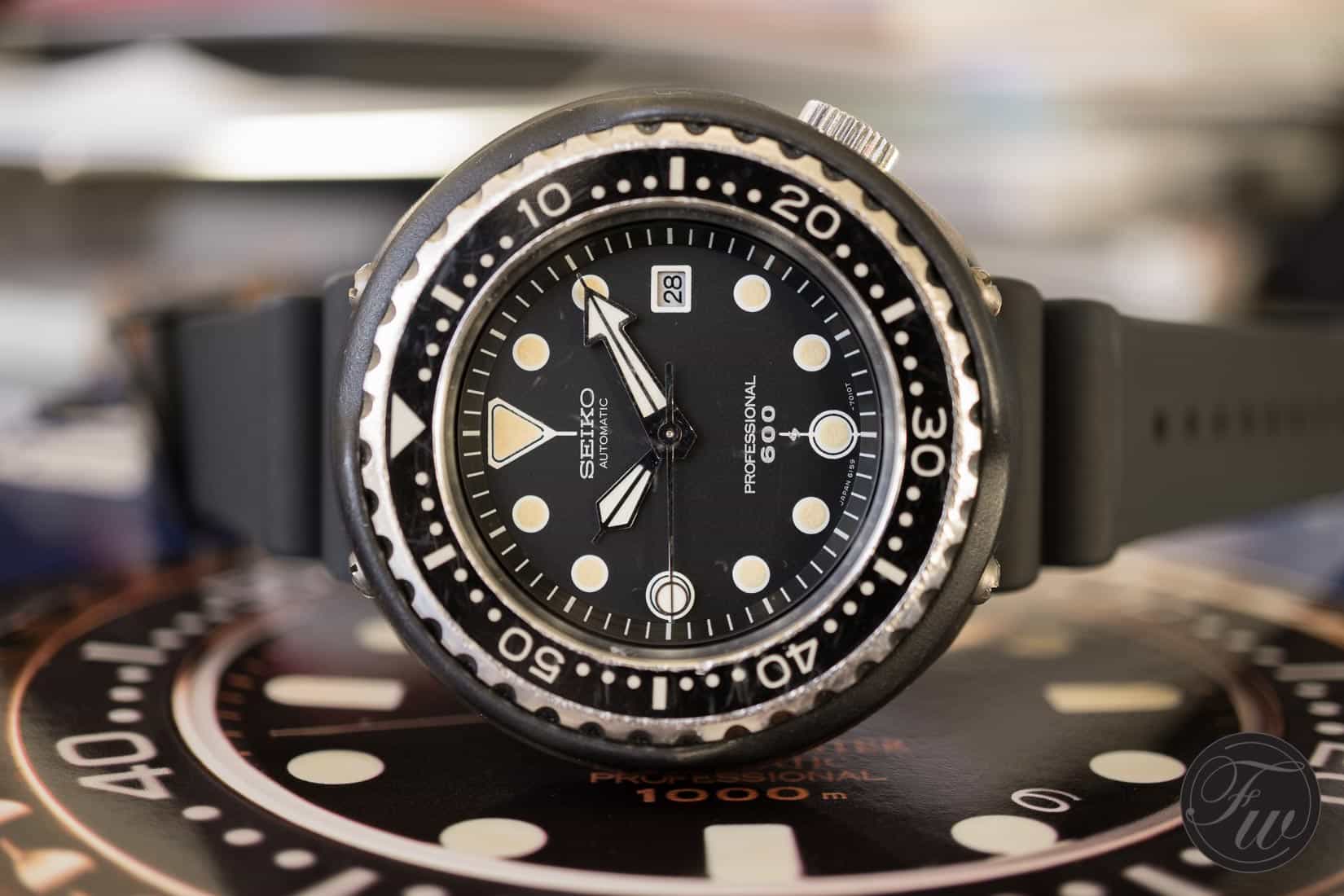
6159-7010
Seiko 6159 Tuna
The last diver to make roll call in the top Vintage Seiko watches list is the undeniably quirky Seiko 6159 Tuna. We’ve covered this watch heavily here on Fratello Watches as both Robert-Jan and I own them. Even though it’s a bit impractical, that tall, shrouded titanium case makes for a tough daily wear, the Tuna is such an icon that it just might be my candidate for a response to the question of “if you had to buy one Seiko, which would you buy?” The 1960’s and 1970’s brought so much inventiveness when it came to divers and the Tuna belongs right there in the crowd amongst legends such as Omega’s Ploprof, Rolex’s Sea Dweller and Doxa’s 300.
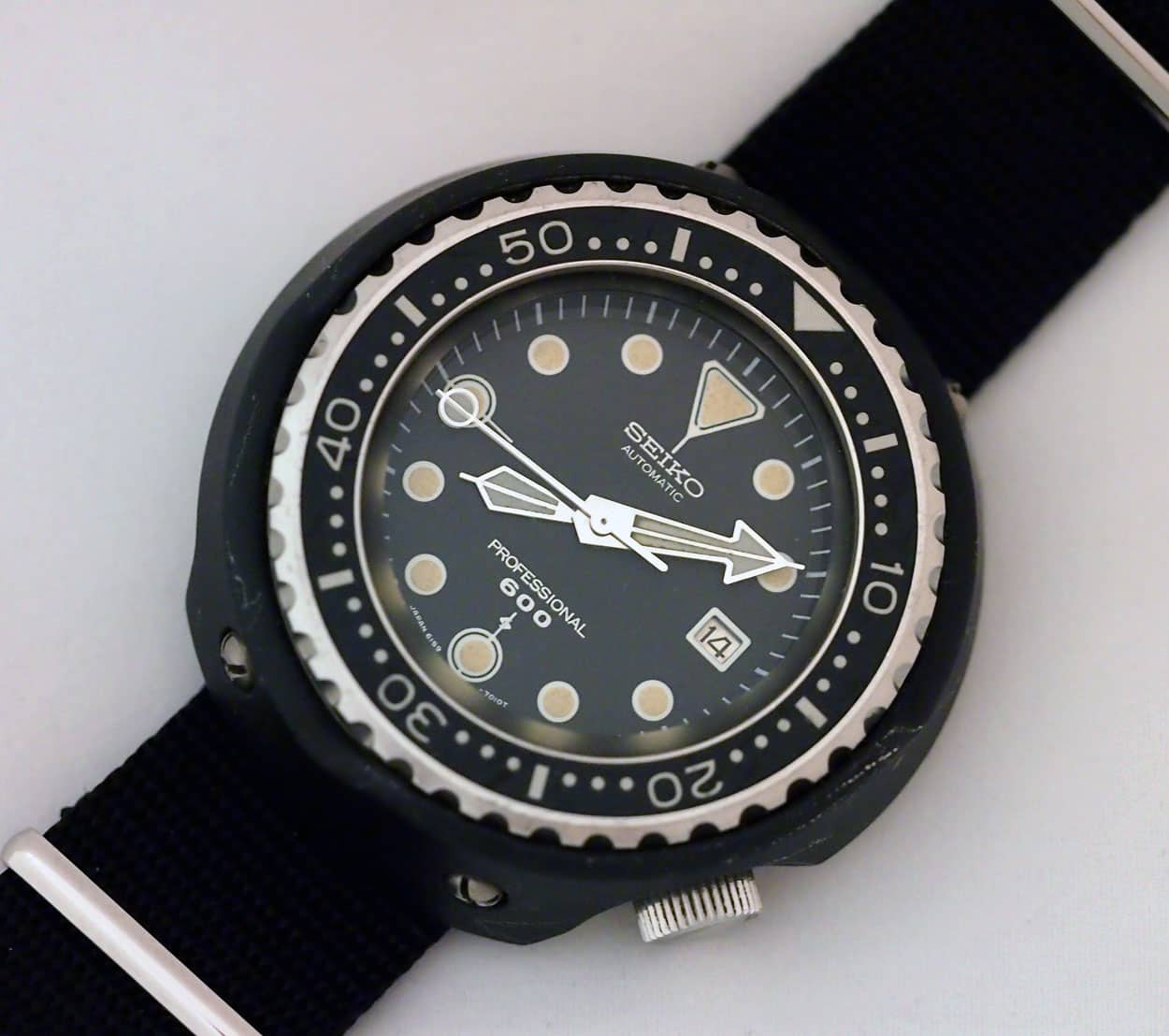
Seiko 6159-7010
It was a creative solution to the needs of deep-water workers and it’s a model that still exists today – in even deeper form. 6159’s have finally moved off the $1500 – 1800 range and now seem to cost around $2,000. They contain rugged hi-beat automatics and outstandingly cool finishing. Still, this price level is not insignificant, so I wouldn’t look down on anyone who decides to buy the less expensive late 70’s 7549-7009 (aka the Gold Tuna) as it was the first quartz professional diver. The Seiko Tuna – it’s almost like a brand on its own.

Seiko Lord Marvel 5740
Seiko Lord Marvel 5740
If the other pieces in this article jump out as “no-brainer” picks for the top Vintage Seiko watches to buy now, the Lord Marvel 5740 likely stands out as a real surprise. It’s a simple looking dress watch that’s attractive enough, but it’s a case where there’s a lot more than meets the eye. This watch was the model that first showcased Seiko’s entry into the world of Hi-Beat 36,000 bph movements. The brand debuted their 5740 movement in 1967 which was only one year after Girard Perregaux introduced the world’s first. Aside from being extremely accurate, a Hi-Beat movement is extraordinary to watch – the seconds hand just glides – and hear. These 5740’s aren’t big by any means at 35mm, but due to their design with decently sized lugs, they wear like a nice dress watch and fit most wrists. Best of all, if you find a cleanly dialed example, $250 should be more than enough to grab history.
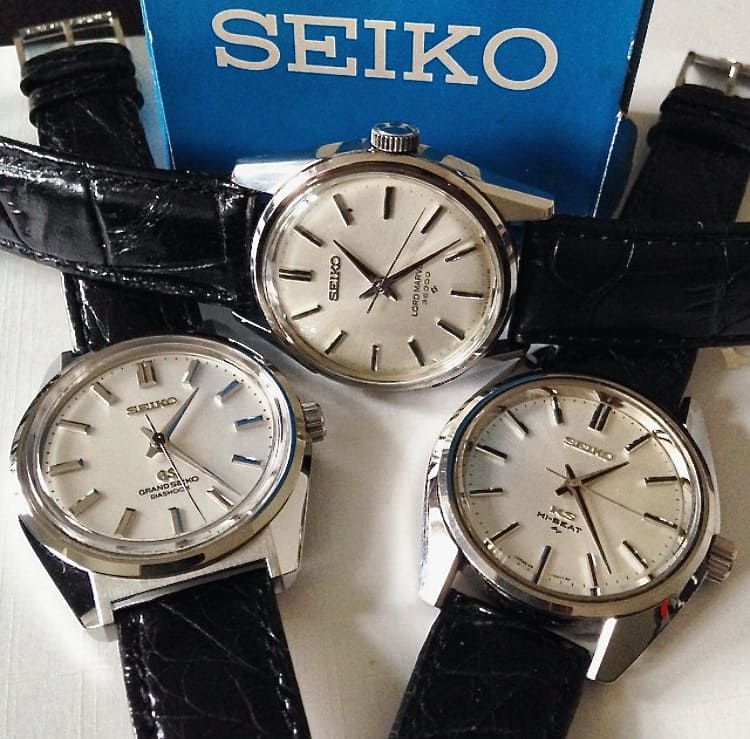
If a King Seiko is still too much for your budget, this is your next best answer. For more info, friend and big-time Seiko collector Christoph McNeill wrote a really nice review here on WornAndWound.
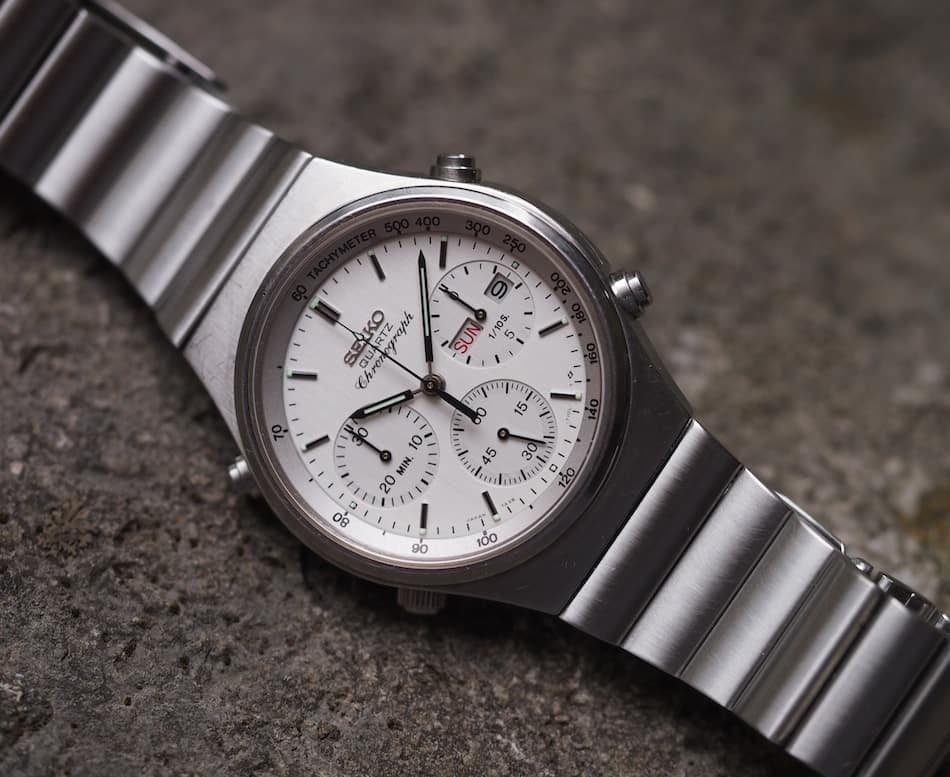
Seiko 7Axx Quartz Chronograph
As our last, but not least, choice on Vintage Seiko watches to buy now, I’m going down the electrical impulse path. Quartz – yes, that’s correct. In 1982, Seiko debuted the 7A28 as the world’s first analog quartz chronograph. Today, I’d make the claim that this chronograph and its relatives, the 7A38 and 7A48, are still highly impressive pieces of machinery. Digital watches have their place, but I’d argue that the 7A28, with its 15-jewel serviceable movement, split timing capabilities and 1/10 second timing is masterfully built. I own a 7A38 – same family but with day and date – and it’s such a well executed watch that it easily competes with many of my favorite purely mechanical pieces.
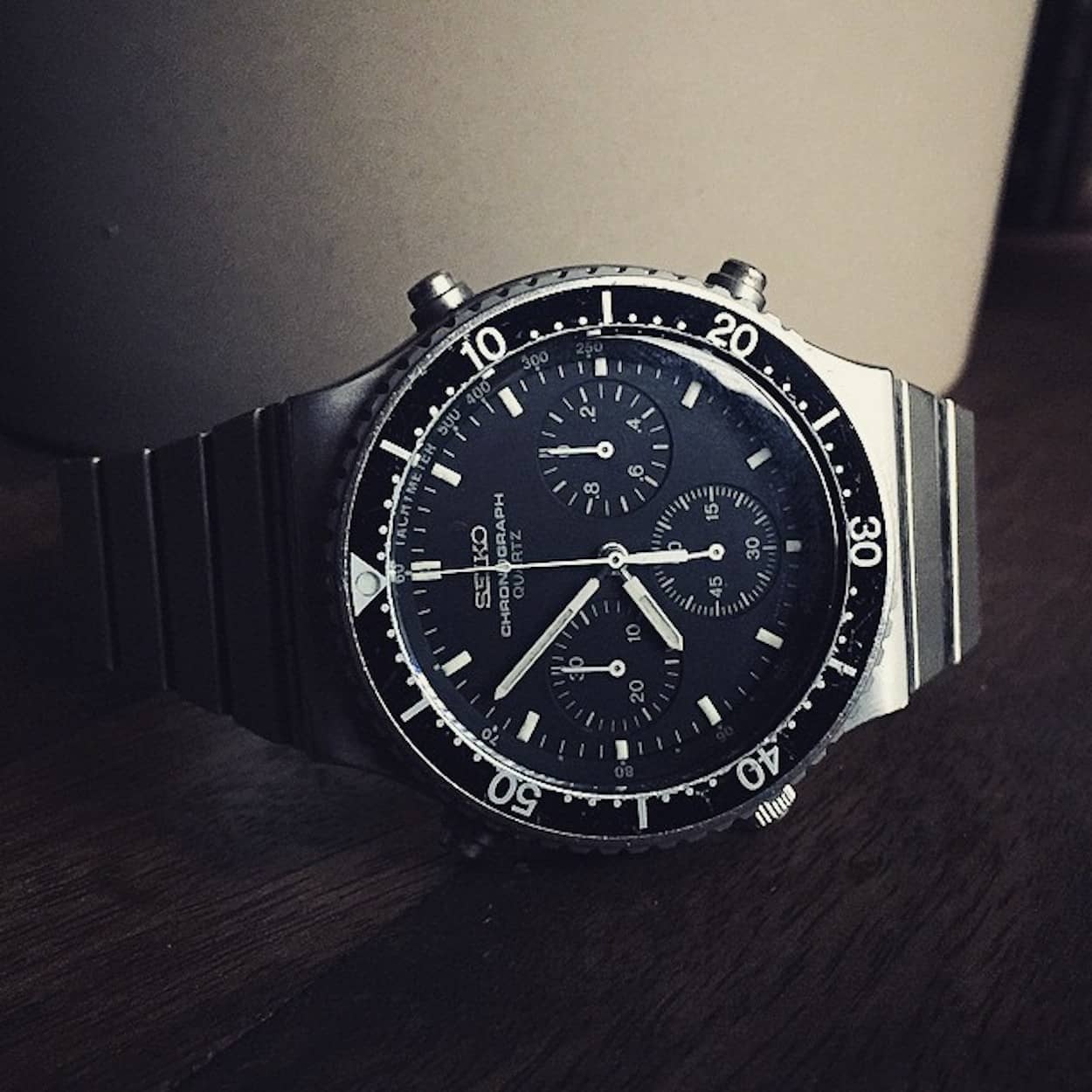
Seiko 7A28
Somehow, with their often elegant and timeless designs, these chronographs manage to achieve something that most battery-powered watches (including many by Seiko) cannot – specifically they have heart. No matter the “7A” variant, options exist for less than $200 and the chief concern is whether all the functions are operational. If not, though, they can be serviced and returned to working order. Despite an electronic heart, these 7A’s garner a lot of collector interest and good ones are starting becoming scarce.
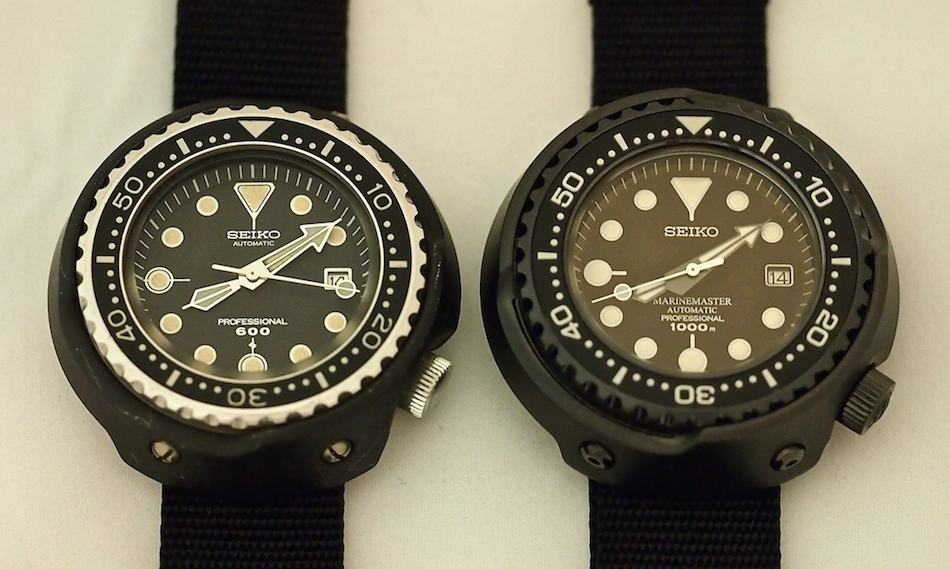
Grandfather Tuna and Tuna
The Top Vintage Seiko Watches
So, that’s it for our list of Vintage Seiko watches that you should buy now. As noted in a recent article on affordable vintage Seiko, there are so many models out there to consider, that it’s difficult to go wrong. Also, I am sure there are fanatics out there who could easily compile a “top 10” list for every sub-genre of vintage Seiko – there are simply that many rabbit holes one can choose to explore. Of course, any time one chooses a specific list, there’s bound to be some controversy, so let’s hear your thoughts on what we may have missed. Happy (Seiko) hunting!
